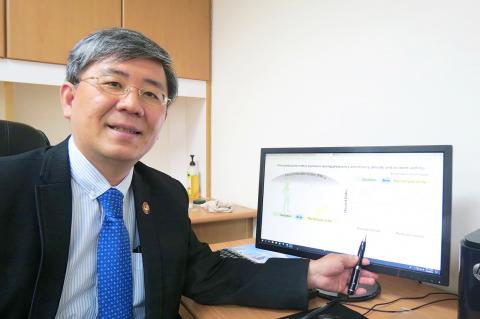Researchers have found that the development of asthma is linked to prenatal and postnatal exposure to airborne particles measuring 2.5 micrometers or less (PM2.5).
The findings were presented in a paper published in the Journal of Allergy and Clinical Immunology coauthored by several researchers, including China Medical University Hospital professor Hwang Bing-fang (黃彬芳), National Taiwan University assistant professor Chen Wei-ting (陳維婷) and Japan Environment and Children’s Study Programme Office professor Jung Chao-ren (鍾朝仁).
The researchers used a cohort study from the Taiwan Maternal and Child Health Database that followed 184,604 children born between 2004 and 2011 in Taichung until 2014.

Photo: Su Meng-chuan, Taipei Times
Previous medical research has concluded that exposure to an environment rich in PM2.5 can trigger an asthma attack or an acute deterioration of the condition, Hwang said.
As more than 300 million people worldwide have asthma — a source of great strain on public health programs and nations’ economies — prevention of the disease has been receiving growing attention and funding in academia, he said.
The researchers said that they used a daily satellite image-based hybrid model to estimate PM2.5 exposure in the Taichung region from 2004 to 2011, citing a collaboration between Harvard University and NASA that found PM2.5 levels could be measured through such imagery.
The cohort study identified 34,336 children with asthma, who were diagnosed with the disease at a mean age of 1.78 to 3.39 years old, Hwang said.
Children exposed to higher levels of PM2.5 during gestational weeks six to 22 and nine to 46 weeks after birth had a significant association with an increased incidence of asthma, he said.
“The exposure-response relationship indicated that the hazard ratio of asthma increased steeply at PM2.5 exposure of greater than 93 micrograms per cubic meter during pregnancy,” paper’s abstract says.
Postnatal exposure to PM2.5 concentrations of 26 to 72 micrograms per cubic meter are also significant, the researchers said, adding that exposure to PM2.5 concentrations of more than 73 micrograms per cubic meter caused a sharp spike in the hazard ratio of asthma.
They concluded that vulnerable periods could include the periods of early gestation, mid-gestation and infancy.
Pregnant women and infants should avoid going outside during peak PM2.5 density periods to reduce the risk of children developing asthma, Hwang said.

DAREDEVIL: Honnold said it had always been a dream of his to climb Taipei 101, while a Netflix producer said the skyscraper was ‘a real icon of this country’ US climber Alex Honnold yesterday took on Taiwan’s tallest building, becoming the first person to scale Taipei 101 without a rope, harness or safety net. Hundreds of spectators gathered at the base of the 101-story skyscraper to watch Honnold, 40, embark on his daredevil feat, which was also broadcast live on Netflix. Dressed in a red T-shirt and yellow custom-made climbing shoes, Honnold swiftly moved up the southeast face of the glass and steel building. At one point, he stepped onto a platform midway up to wave down at fans and onlookers who were taking photos. People watching from inside

A Vietnamese migrant worker yesterday won NT$12 million (US$379,627) on a Lunar New Year scratch card in Kaohsiung as part of Taiwan Lottery Co’s (台灣彩券) “NT$12 Million Grand Fortune” (1200萬大吉利) game. The man was the first top-prize winner of the new game launched on Jan. 6 to mark the Lunar New Year. Three Vietnamese migrant workers visited a Taiwan Lottery shop on Xinyue Street in Kaohsiung’s Gangshan District (崗山), a store representative said. The player bought multiple tickets and, after winning nothing, held the final lottery ticket in one hand and rubbed the store’s statue of the Maitreya Buddha’s belly with the other,

‘NATO-PLUS’: ‘Our strategic partners in the Indo-Pacific are facing increasing aggression by the Chinese Communist Party,’ US Representative Rob Wittman said The US House of Representatives on Monday released its version of the Consolidated Appropriations Act, which includes US$1.15 billion to support security cooperation with Taiwan. The omnibus act, covering US$1.2 trillion of spending, allocates US$1 billion for the Taiwan Security Cooperation Initiative, as well as US$150 million for the replacement of defense articles and reimbursement of defense services provided to Taiwan. The fund allocations were based on the US National Defense Authorization Act for fiscal 2026 that was passed by the US Congress last month and authorized up to US$1 billion to the US Defense Security Cooperation Agency in support of the

‘COMMITTED TO DETERRENCE’: Washington would stand by its allies, but it can only help as much as countries help themselves, Raymond Greene said The US is committed to deterrence in the first island chain, but it should not bear the burden alone, as “freedom is not free,” American Institute in Taiwan Director Raymond Greene said in a speech at the Institute for National Defense and Security Research’s “Strengthening Resilience: Defense as the Engine of Development” seminar in Taipei yesterday. In the speech, titled “Investing Together and a Secure and Prosperous Future,” Greene highlighted the contributions of US President Donald Trump’s administration to Taiwan’s defense efforts, including the establishment of supply chains for drones and autonomous systems, offers of security assistance and the expansion of